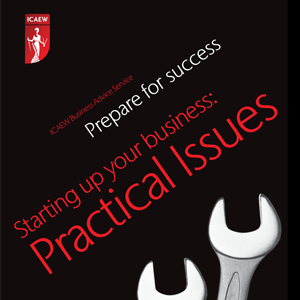Starting up your business: Practical issues

You’re ready to start your new business; you’ve done your research, tested your product and obtained the best advice you can. There are a few more things you need to consider before you start trading.
Starting up your business:
Practical issues
1. Who do i need to notify?
If you have chosen to be a sole trader you
must notify HM Revenue and Customs
(HMRC). You can register your business
using HMRC online services.
Businesses which reach the threshold for
compulsory VAT registration (this threshold
is revised every tax year) must notify
HMRC. However, it can be advantageous to
register even if you are below the threshold.
To register for VAT you must notify HMRC.
Depending upon the nature of your
business and whether you are operating
from a business premises, there may be
other bodies you should notify, such as your
local authority.
If you create a limited company, you must
notify Companies House, who will then
notify HMRC. HMRC will send you a form
that you must complete and return within
three months of issue.
2. What accounting records are required?
Every business is required by HMRC to keep
adequate records. HMRC does ‘Records
Checks’ to ensure businesses comply with
their requirements. Similarly, businesses
registered for VAT must maintain financial
records according to the guidelines given
by HMRC.
If your business is a limited company, it is a
requirement of the Companies Act that you
should keep proper accounting records of
money received and paid, of all sales and
purchases, and of assets and liabilities.
HMRC requires every business which
employs staff to keep proper records
for Pay As You Earn (PAYE) and for the
calculation of tax liabilities. All employers’
payrolls are linked to HMRC using Real Time
Information. In some types of business,
there are additional records that have to be
kept to satisfy government requirements.
If your records are inadequate in any of
these areas, you could be breaking the law.
3. Should I use accounting software?
4. Can I start my business by working
from home?
5. What happens if I use my own vehicle?
Download the full document here
Prepare for business,
prepare for success.
ICAEW Business Advice Service
The ICAEW Business Advice Service (BAS) provides
professional advice for start-ups and owner-run businesses.
As well as practical help online in the form of white papers,
short PDFs and blog articles, we enable businesses to
receive an initial consultation at no charge from an ICAEW
Chartered Accountant.
ICAEW Chartered Accountants are the biggest source
of business advice, reaching over 1.5m businesses from
more than 20,000 offices across the UK.
If you need further help with VAT issues,
a free initial discussion with an ICAEW
Chartered Accountant is a good place to
start. Visit businessadviceservice.com
This leaflet is part of a series.
To find out more see our resources page
